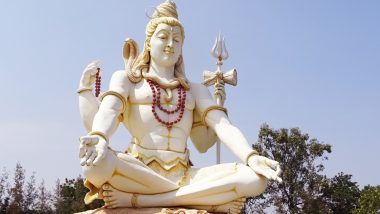In Indian households, it is a common sight to see elders instructing the younger lot to keep off non-vegetarian food among other restrictions during the month of Shravan or Sawan. The auspicious Sawan Maas or Shravan Maas , began this year on July 23 and will end on August 22. Considered to be one of the holiest months in the Hindu calendar, Sawan begins in late July and ends in the third week of August. The month is dedicated to the worship of Lord Shiva.
Shiva’s devotees observe the month by fasting, offering prayers and following certain rituals and practices throughout the month. It marks the onset of the new moon and the beginning of the sun’s transition into Leo zodiac.
The month has immense significance amongst believers and they strictly follow the rituals and pray to Lord Shiva during the Shravan.
The Story and Significance of Shravan Month

According to the story mentioned in the Puranas, the churning of the ocean of milk or the Samudra Manthan in search of amrit (elixir), took place during the month of Shravan. During the process, fourteen rubies emerged from the ocean and thirteen of them were divided amongst the devas (gods) and the asuras (demons). Halahala, the fourteenth ruby remained untouched because of its deadly poison that could destroy the entire universe. Lord Shiva drank it and stored it in his throat, which is why it turned blue. Due to the impact of the poison Lord Shiva wore a crescent moon on his head and all the gods started offering water from the holy river of Ganges to Lord Shiva, to reduce the effects of the poison. Since these events unfolded during the month of Shravan, Lord Shiva and the onset of the new moon are significant during the month as they mark the prosperity of mankind.
Another important significance of the month is that Lord Shiva and his wife Parvati were united during Shravan. Parvati was the daughter of King Daksh and desired to marry Lord Shiva. So she performed penance during the Shravan month, pleased by which, Shiva fulfilled her wish and married her.
The Significance of Fasting

Special rituals are followed during the Shravan. Devotees fast during the month, especially on Mondays since the day is dedicated to Lord Shiva in Hinduism. This fast is known as the Shravan Somvaar Vrat. Some also observe a fast on the Tuesdays of Shravan month which is called the Mangala Gauri Vrat. Lord Shiva is worshiped by women, single and married alike during Sawan. Single women fast in order to get a worthy husband and married ones for the well-being of their husbands.
Other Significance

According to the Vedas and Puranas, the month of Shravan is dedicated to worshiping Lord Shiva for success, marriage and prosperity.
Many other festivals like Krishna Janmashtami, Raksha Bandhan, Naag Panchami, and Teej also fall in the month of Shravan, making it even more auspicious.
Devotees also do Mahamrityunjay Jap, offer milk and water to Lord Shiva, worship the Shivling, donate food and money to the needy and also refrain from eating meat.
In this auspicious month of Sawan Maas, followers will take up many rituals such as eschewing nonvegetarian food, chanting Mahamrityunjaya mantra, worshiping the Shiva Linga and wearing rudraksha. The auspicious month signifies happiness and prosperity, hence it is also a great time for marriages and other auspicious functions.
(The above story first appeared on LatestLY on Jul 26, 2018 05:47 PM IST. For more news and updates on politics, world, sports, entertainment and lifestyle, log on to our website latestly.com).













 Quickly
Quickly






















